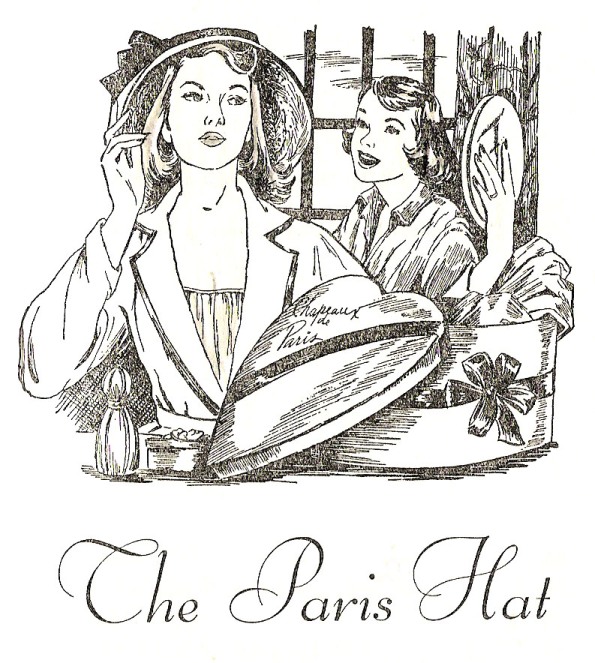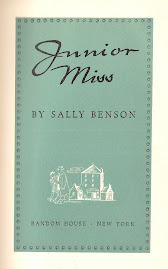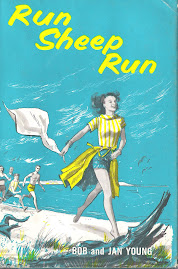Title: A Girl Can Dream
Author: Betty Cavanna
Publisher: Scholastic reprint, 1961 (original publication date, 1948)
Setting: Avondale, a small town in Pennsylvania
Fun: Stalls, Spins, reading Seventeenth Summer
Quote: "Reluctant as Rette was to admit it, she recognized that Elise was looking at flying through more mature eyes than she was. Rette had to accord her a certain admiration. Elise was learning to handle a plane as smoothly as she handled boys, and without undue fuss."
"Everyone at school wondered who was going to win the free flying lessons," is as nice a tagline as I've read for a book in a long time. A Girl Can Dream is set in 1948. Loretta (Rette) Larkin idolizes her older brother, Tony, who flew for the 82nd Airborne. Meanwhile, some farmland has been converted to a new airport, and the owner of the airport shows up at the high school and announces an essay contest, with the prize to be 10 free flying lessons. There's some question as to whether girls should enter at all, but in the end Lorette (Rette) Larkin and popular girl Elise Wynn, do, and Rette wins.
This sets the stage for a rivalry between the girls, though it never grows very heated. Elise's wealthy father pays for her to have lessons, and the girls share an instructor, also a woman (Mrs. Larkin notes that the instructor flew for the WASPs.) In a climatic scene, Elise's plane disappears from view, and Rette and the other rescuers find her worried about a bull in the field where she has nonchalantly landed her Cessna. Some of Elise's sophistication rubs off on Rette, too, although the narrative never strays far from flying.
One of the more interesting aspects of A Girl Can Dream is that it contains a tribute to Maureen Daly's Seventeenth Summer. The book is recommended to Rette by a salesgirl in a bookstore and she's gets totally caught up in it: "The amazing part of it was that Angie Morrow and Jack Duluth didn't seem like book characters at all. They were just like any girl and boy that Rette might be going to school with, except that she knew more about them, about the way they thought and felt, than she did any of her friends."
A Girl Can Dream is one of Cavanna's earlier books and not one of her more sparkling, but it stands as something of a rebuke to anyone who thinks that girls' books of this era were not very adventurous.
It's all about...popular girls...rec rooms...summers at the lake...dates with wealthy, thrill-crazy boys...black-market antiques...small town political corruption...and finding your true path in life. The Paris Hat considers the sometimes frothy, sometimes serious world of novels for teenage girls from the 1950s and 60s.
Tuesday, July 24, 2012
Thursday, February 2, 2012
Title: A Girl Called Hank
Author: Amelia Elizabeth Walden
Publisher: William Morrow, 1951
Jacket: Not credited
Setting: Basketball-crazy New England
Provenance: Formerly the property of "Sue Greanne, 14A"
Fun: Square dances in the barn; Scottie dogs; buzzer beaters
Quote: "I can never go back now, she thought. I can never go back to this afternoon. Something is happening to me. Something I can't stop or control. I'll never be the same again."
It's not as well known as the Newbery or the Printz, but each year since 2008 the Assembly on Literature for Adolescents (ALAN) has given out the Amelia Elizabeth Walden Award for a YA novel which is "most relevant to adolescents and having enjoyed a wide and appreciative teenage audience” and "possess[es] a positive approach to life, widespread teen appeal, and literary merit." Past winners/honorees include Kristin Cashore, Rick Yancey and Jacqueline Woodson, although I have to admit I haven't heard of this year's winner, Francisco X. Stork's The Last Summer of the Death Warriors. The ALAN cites Walden as a pioneer of writing for teens, starting with the novel Gateway, in 1946. Although Walden wrote for adults as well, and frequently dabbled in the mystery genre, any survey of her teen books will turn up a major motif: sports, and in particular, basketball. Of those, A Girl Called Hank is probably her best known title.
Recently I was looking through some local high school yearbooks from the early 60s. The sports pages were very basic: baseball, football, basketball and track. There were no girls' sports at all. I was well aware that the growth of girls' sports dates to the implementation of Title IX in the 1970s, but I was still taken aback. Perhaps Las Vegas was just too fledgling a community to support more than a couple of sports, because in the world of A Girl Called Hank, set on the East Coast, girls' basketball is HUGE. Brighthaven High School, champions several years running, plays to wildly cheering crowds and the boys' team, if there is one, doesn't even rate a mention.
Hank (Henrietta) Baxter, a tomboy who's grown up playing basketball with four brothers, is the star of the team. Two plots develop: the attentions of Greg, who is on the school newspaper (he's on the college track, the book notes, while Hank, who wants to run her father's lumber company someday, nevertheless doesn't plan on anything beyond secretarial school) and the hiring of a new coach, Miss Dorn, a former tennis star from California. Hank gives Greg short shrift for awhile, but eventually succumbs to the attentions of her mother and sister-in-law and gets dressed up for a date with him. Miss Dorn, who has been hired in spite of the fact she seems to have no experience as a coach, lost her tennis career to a hand injury and is now a "bitter, twisted" person. She takes a dislike to Hank, and the feud between them divides the team.
The two plots resolve in satisfactory, if predictable, manners. Hank adds the ability to consider her own appearance to her formidable basketball skills, and, after grudging truce with Miss Dorn, learns the importance of zone defense and set plays. And in the final few pages, now that basketball season is over, the prospect of going to the prom is raised, as well as, yes, a wedding. Hank's love of basketball and her interest in being a businesswoman are so solidly established, however, that these seem more like tentative pipings than real indications of her future.
It's sort of hard to know what to make of A Girl Called Hank. Walden wrote enough of these books that there must have been a market for them, although, if the Las Vegas was more typical than Walden's Brighthaven, there couldn't have been that many girls seriously seeking athletic stardom. It's concerned far more with Hank's relationships with the girls on the team and Miss Dorn than it is with Greg. (It's possible to read something into that, but it seems a little far-fetched to me.) Perhaps the best thing to do is chalk it up to a writer writing, and building a world around, something she truly loves. It's nice that Walden found the audience she did, and it's even nicer that her name is used to continue the tradition today.
Author: Amelia Elizabeth Walden
Publisher: William Morrow, 1951
Jacket: Not credited
Setting: Basketball-crazy New England
Provenance: Formerly the property of "Sue Greanne, 14A"
Fun: Square dances in the barn; Scottie dogs; buzzer beaters
Quote: "I can never go back now, she thought. I can never go back to this afternoon. Something is happening to me. Something I can't stop or control. I'll never be the same again."
It's not as well known as the Newbery or the Printz, but each year since 2008 the Assembly on Literature for Adolescents (ALAN) has given out the Amelia Elizabeth Walden Award for a YA novel which is "most relevant to adolescents and having enjoyed a wide and appreciative teenage audience” and "possess[es] a positive approach to life, widespread teen appeal, and literary merit." Past winners/honorees include Kristin Cashore, Rick Yancey and Jacqueline Woodson, although I have to admit I haven't heard of this year's winner, Francisco X. Stork's The Last Summer of the Death Warriors. The ALAN cites Walden as a pioneer of writing for teens, starting with the novel Gateway, in 1946. Although Walden wrote for adults as well, and frequently dabbled in the mystery genre, any survey of her teen books will turn up a major motif: sports, and in particular, basketball. Of those, A Girl Called Hank is probably her best known title.
Recently I was looking through some local high school yearbooks from the early 60s. The sports pages were very basic: baseball, football, basketball and track. There were no girls' sports at all. I was well aware that the growth of girls' sports dates to the implementation of Title IX in the 1970s, but I was still taken aback. Perhaps Las Vegas was just too fledgling a community to support more than a couple of sports, because in the world of A Girl Called Hank, set on the East Coast, girls' basketball is HUGE. Brighthaven High School, champions several years running, plays to wildly cheering crowds and the boys' team, if there is one, doesn't even rate a mention.
Hank (Henrietta) Baxter, a tomboy who's grown up playing basketball with four brothers, is the star of the team. Two plots develop: the attentions of Greg, who is on the school newspaper (he's on the college track, the book notes, while Hank, who wants to run her father's lumber company someday, nevertheless doesn't plan on anything beyond secretarial school) and the hiring of a new coach, Miss Dorn, a former tennis star from California. Hank gives Greg short shrift for awhile, but eventually succumbs to the attentions of her mother and sister-in-law and gets dressed up for a date with him. Miss Dorn, who has been hired in spite of the fact she seems to have no experience as a coach, lost her tennis career to a hand injury and is now a "bitter, twisted" person. She takes a dislike to Hank, and the feud between them divides the team.
The two plots resolve in satisfactory, if predictable, manners. Hank adds the ability to consider her own appearance to her formidable basketball skills, and, after grudging truce with Miss Dorn, learns the importance of zone defense and set plays. And in the final few pages, now that basketball season is over, the prospect of going to the prom is raised, as well as, yes, a wedding. Hank's love of basketball and her interest in being a businesswoman are so solidly established, however, that these seem more like tentative pipings than real indications of her future.
It's sort of hard to know what to make of A Girl Called Hank. Walden wrote enough of these books that there must have been a market for them, although, if the Las Vegas was more typical than Walden's Brighthaven, there couldn't have been that many girls seriously seeking athletic stardom. It's concerned far more with Hank's relationships with the girls on the team and Miss Dorn than it is with Greg. (It's possible to read something into that, but it seems a little far-fetched to me.) Perhaps the best thing to do is chalk it up to a writer writing, and building a world around, something she truly loves. It's nice that Walden found the audience she did, and it's even nicer that her name is used to continue the tradition today.
Thursday, January 19, 2012
Fast Times at Central High
Author: Naomi John Sellers
Publisher: Doubleday, 1953
Jacket: not credited
Setting: Midland,a small city in an unnamed Southern state
Fun: cherry Cokes; gossip; nightclub singers who sing "songs with double meanings"; the pursuit of Mammon
Quote: "'Kathy!" he said, and he pressed his cheek against mine, and I could feel the beat of his heart intermingled with mine. "Why don't you stop being such a little fool? What are you trying to do -- change the world?""
Kathy Barnum is a senior, new to a high school which is dominated by sorority-like clubs. These clubs are not quite the same as the ever-shifting cliques popular in contemporary YA; they are formal organizations, with officers, pledges and initiations. The text points out a couple of times that sororities and fraternities are "against state law," but the clubs dominate the school, choosing candidates for school elections, running the newspaper, picking the Football Queen and even arranging the lead in the school play, all apparently without the knowledge of the administration. Kathy feels like an outsider until she is asked to pledge the GCs, or Golden Circle, although her main interest is in handsome Chuck Taylor, editor of the school newspaper and a member of the Owls, the male version of the GCs.
Life with the GCs takes us through a mildly decadent world of roadhouses, idle, invisible parents and slightly risque nightclubs. Consciously or unconsciously, Cross My Heart is strongly imitative of Maureen Daly's classic Seventeenth Summer: the same breathless inner narration, ("I stood there a moment, the paper in my hand, listening to the little sighing sound the wind made through the bare branches of the trees, and I thought how sad everything seemed, almost as if the whole world were sick and dying") with particular attention to descriptions of scenery ("I remember thinking how beautiful the night was with the moon coming up, big and orange-colored through the bare branches of the trees that were so interwoven they looked like black lace,") clothes, and houses. It even has the subplot of an older sibling whose unhappy love affair shadows that of the heroine. I'd read about half-way though, thinking that the reason Cross My Heart is less satisfying than Seventeenth Summer is because Kathy is less sure of herself, when the book takes a turn, and Kathy begins to stand up to the GCs.
It's interesting that the issues on which Kathy asserts herself are very small ones: a nasty article submitted to the school gossip column, an attempt by the GCs to boot out a legitimately-elected class president. Yet they carry the air of life and death. Sellers brings off wonderfully the intricacies involved in what might be seen as minor teenage dramatics. Kathy loses the GCs, of course, and comes to understand that Chuck is little more than a overgrown boy.
The title of Cross My Heart comes from a deal between Kathy and her father. She wants to be a journalist, a career he considers "too rough for a woman." He wants her to go a women's college instead of the state university. The deal is that if she stays on the Honor Roll, she can go to the college of her choice. Kathy, in fact, fails to keep her end of the deal: she is accused of cheating by the GC members and (somewhat mysteriously to the reader) doesn't act to clear her name, and is dropped from the Honor Roll. But all is forgiven once her father finds out the truth, and Kathy ends the novel certain of herself, whatever she chooses.
Subscribe to:
Comments (Atom)













